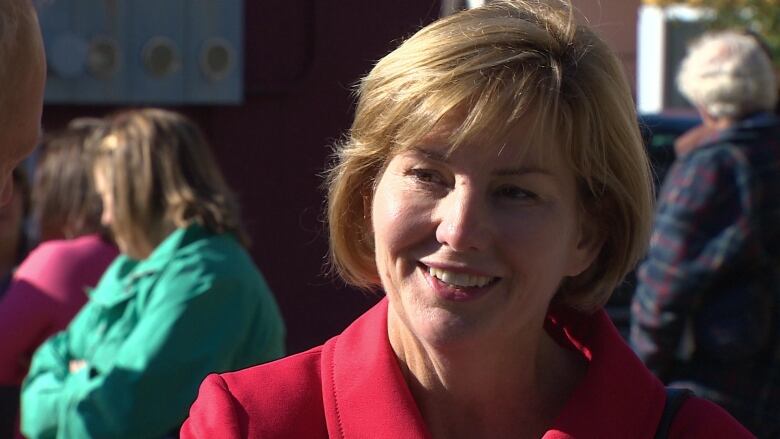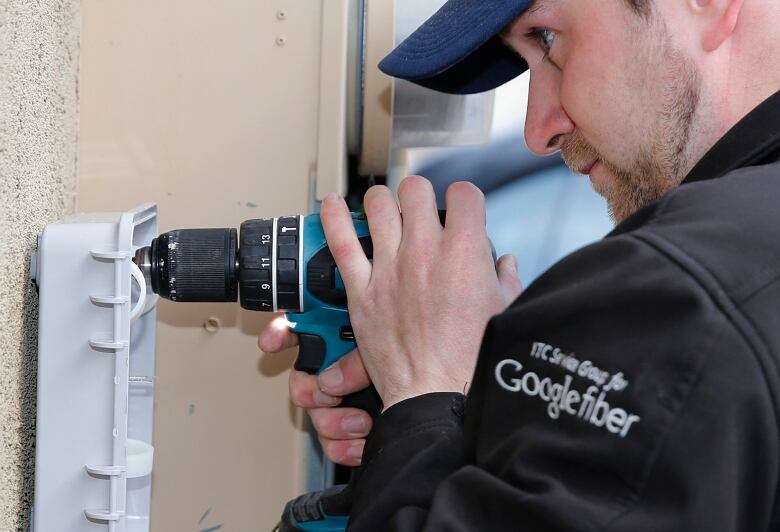Karen Ludwig promises rural internet service to be improved
Ottawa promising to upgrade broadband service, but rural users say they've heard that before

New Brunswickers in rural areas with poor internet service are once again being promised that taxpayer-funded improvements are on the way.
New Brunswick Southwest MP Karen Ludwig has been using social media to tout a federal government promise to spend $500 million upgrading high-speed broadband in rural areas.
But it's a promise New Brunswickers have heard beforeand have helped subsidize.
Ludwig, a rookie Liberal MP, said she heard repeated complaints about poor internet service in rural areas of the riding while she was campaigning last year.
"One of the issues that was pretty consistent across all the rural constituencies is the issues and the limitations of broadband," she told CBC News.

But it sounds familiar to New Brunswickers such as Michelle Tidd, who lives outside St. George in Charlotte County.
In 2009, the provincial Liberal government of premier Shawn Graham gave Woodstock-based Barrett Xplore Inc. $13 million to upgrade its internet infrastructure.
The Liberals later added a $10-million loan guarantee to the package.
The following year, Graham announced the company, Xplornet, had achieved 100percent coverage of the province, ahead of schedule, with its tower-and-satellite-based network.
It's slow, it doesn't stream properly.- Michelle Tidd, rural resident
Company chair Bill Barrett said in the same release that New Brunswick had become "Canada's first fully broadband-enabled province."
But Tidd says Xplornet told her they couldn't provide service to her home, which is just one kilometre north of Highway 1 near St. George.
Tidd says she was a Bell customer at first, but when the company wasn't able to give her the data she needed, she contacted Xplornet.
"People have said, `Xplornet, it's great,' but then we found out it's slow, it doesn't stream properly," she said.
And when the company's technicians came to her home, "they said, `no, we can't give it to you,'" she said.

Elaine Miles, the director of marketing and communications for Xplornet, saidshe'd need to know more about Tidd's complaint and others before commenting on the specifics.
"We would encourage people to reach out to us directly so we can help them," Miles said.
But, she added, "we do offer 100percent access" in New Brunswick.
Tidd saidlack of bandwidth to her home is a challenge because a lot of her 12-year-old daughter's school homework is posted via a website.
"We have to go the library in St. Andrews," she said. "We have to catch the library [when it's open] on a Tuesday night or on a weekend. We have to go to friends' houses."
Service not keeping pace
Tidd's MLA, Liberal cabinet minister Rick Doucet, saidthe service funded by the Liberals in 2009 hasn't been able to keep pace with the huge volume of data on the internet.
Doucet took part in the 2009 announcement and is now the province's economic development minister.

"But what's happened since then is we've had an explosion of internet use, broadband use. We have things like Netflix, we have things like YouTube, we have things like CBC online streaming."
That higher volume of traffic has overwhelmed the existing infrastructure, Doucet said.
Xplornet's Miles disputed that explanation, andsaid the company has continued to upgrade its infrastructure in New Brunswick.
"From our standpoint, there is not any issue with being able to provide the service for how families use the internet today."
Doucet saidthe low population density in rural areas means it's not profitable for other companies like Bell to lay fibre-optic cable, because they won't get enough customers to recoup their investment.
Doucet saidthe lag between subsidized rural internet infrastructure and the volume of data traffic is likely to continue.
"If we make an announcement today that we are going to fund a project, by the time the project gets up and running it could be outdated," he said.
No details on internetimprovements yet
Ludwig saidNew Brunswick "needs a strong federal partner that's going to cheerlead it, and also provide a significant amount of infrastructure funding."
But she saidit's too early to lay out exactly how Ottawa's $500 million will be spent.
"It's high-level in the budget and the details have not been determined yet," she said. "The good news part is it's committed."
Doucet saidit remains to be seen if the federally-subsidized improvements can keep pace with the ever-growing volume of data.
"We're looking forward to what the federal government has to offer, but we've got to be pretty strong with what we put forward because we've got to make sure it lasts a lot longer."












_(720p).jpg)


 OFFICIAL HD MUSIC VIDEO.jpg)
.jpg)



























































































